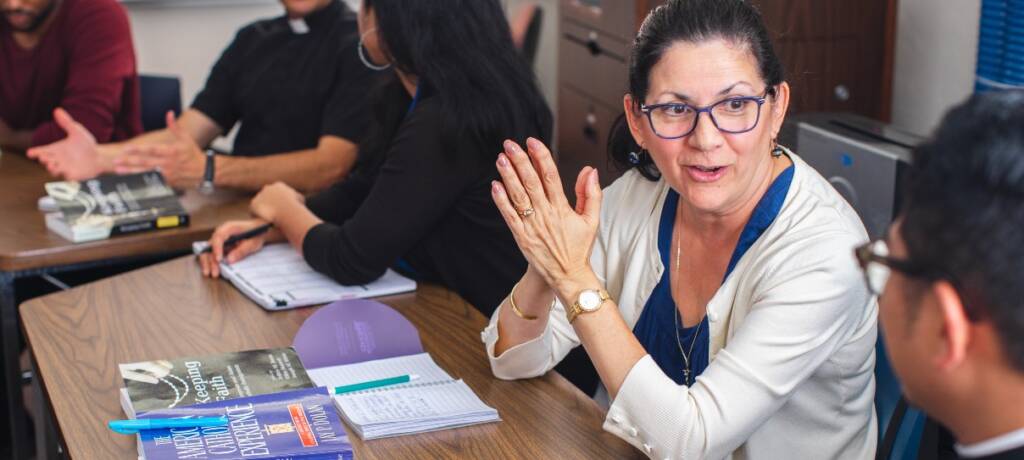Members of a religious group who have been baptized but are not part of the clergy are known as lay people, or the laity. Members who minister, therefore, are called lay ministers.
While people may view ministry as solely the role of ordained individuals, there are many opportunities to minister outside of the clergy. Ministry is a form of teaching, and can be a way for any individual or group to spread the word of God and the Scripture to others. In the broadest sense, ministry can happen anywhere — in the church, on the street, at the hospital bedside, and at home.
What Is Lay Ministry?
Lay ministry (or lay ecclesial ministry, LEM) is a type of service performed within a church or religious group by people who have not been ordained. Since the Second Ecumenical Council of the Vatican (Vatican II) expanded the role of the laity in the Catholic Church in the 1960s, more lay people have taken on ministerial roles within or beyond their parish community.
According to the United States Conference of Catholic Bishops (USCCB), lay ecclesial ministry is:
- Service done by lay persons who have taken the Sacraments of Initiation (but not Ordination).
- Performed within the community of the Church to serve its mission under the supervision of the hierarchy.
- Part of the work all Christians are compelled to do in service of Christ’s ministry.
This updated role of the Catholic laity was described by Pope Paul VI in Ministeria Quaedam, one of the documents issued following Vatican II. In it, he describes how “[certain] ministries for the worship of God properly and for the service of the people of God to be performed according to the needs of the people have been established in ancient times by the Church; to whom the duties of sacred liturgy and of charity were entrusted to the faithful to be performed, and accommodate to various circumstances.”
According to this text, interpretation and communication of the liturgy can therefore be performed by both laity and ordained officials. Depending on their preparation, interests, and parish, some lay people perform ministry on a voluntary or temporary basis, while others hold more established positions and may even be employed by the church. Lay ministry can be practiced in the “gathered” church — during worship services, in catechetical programs, in study groups — or in the scattered church, such as in the community or workplace.
Catholic church members, both men and women, can become lay ministers in several different ways.
- For diocesan-wide ministry, a bishop will approve or recommend lay people for certain ministerial positions.
- Lay people can be appointed by a pastor or assistant pastor for parish-specific roles in youth ministry, children’s ministry, music ministry, and more.
For a role in LEM, most people will need to complete several years of formation to prepare. This can include attending regular one-on-one meetings with a parish leader, self-directed study of Scripture, ecclesiology, and catechesis, and perhaps additional, church-sponsored studies in specializations like youth ministry, trauma ministry, or liturgy.
What Does a Lay Minister Do?
The term “lay minister” is not necessarily a specific title, but rather encompasses a wide range of duties and possibilities.
Catholic lay ministry is typically characterized by:
- Authorization or approval by church leadership to serve the parish through a specific area of ministry.
- Working closely with ordained members of the church hierarchy.
- Preparation and formation in the relevant responsibilities. This can include pedagogical instruction, liturgical study, the study of music used in worship, catechesis, lay ministry certification programs, theological studies courses, etc.
Lay Ministry in the Catholic Church
Actual titles may vary from parish to parish, diocese to diocese, but the purpose of lay ministry is to make liturgical interpretation more accessible to those outside church leadership.
USCCB characterizes Catholic lay ministry in the following ways:
- Public service in a parish or community
- Authorized by the hierarchy
- Often in a particular area of ministry
- Involves close mutual collaboration with bishops, priests, and deacons
- Requires appropriate preparation and formation according to the level of determined responsibilities
Lay ministry examples in the Catholic church include:
- Pastoral associate
- Director of religious education
- Youth minister
- Catechist (someone who dedicated their life to teaching the faith)
- Pastoral musician
- Acolytes
- Ushers
- Altar guild
- Greeters
- Lectors
- School principal (if affiliated with a specific parish)
- Hospital chaplain (as a parish representative)
For more formal roles, such as those with defined titles and responsibilities, laity can only assume the positions once they have completed the proper formation. This can include studying the Bible, theology, ministerial arts, and pedagogy. They may also need to gain some experience before assuming a formal role, which can be accomplished through shadowing or apprenticeships. Once instated in a formal role, members of the lay ministry will continue to receive formation through their bishop or another church leader.
Lay Ministry in Your Community
Of course, lay ministry can reach beyond the walls (literal or figurative) of the church. Community ministry roles can include:
- Military, prison, hospital, and police chaplains
- Campus ministers
- Street preachers
- Camp and youth program ministers
Though these positions do not require ordination, a certain level of education and formation is preferred, especially if the role is part of a larger organization. Lay people with degrees in divinity and ministerial arts are well equipped to lead ministries, while those with degrees in theological or religious studies have an academic foundation on which to build their ministry practice.
How to Become a Lay Minister
Since you do not need a Master of Divinity or to be ordained to become a lay minister, there are opportunities available for men and women who hold bachelor’s, master’s, or associate’s degrees, high school diplomas, certificates, or simply those with vast life experience in relevant areas. However, a master’s degree (or at least a bachelor’s) in a related field like theological studies, ministerial arts, or religious studies can be a valuable asset when identifying and pursuing opportunities for lay ministry.
Regardless of educational background, the first concrete step toward lay ministry is careful discernment of fit and purpose. Prayer and meditation on Scripture can act as a guide, and an ongoing dialogue with a spiritual director or mentor can help answer questions or guide the candidate in their pursuit. This person can also consider the candidate’s suitability from multiple personal and practical standpoints, taking into account:
- Their ability to form meaningful relationships
- How they demonstrate understanding, love, and compassion toward others
- Their spiritual life and habits
- Their knowledge of theological and pastoral studies
- Their ability to communicate with people across various backgrounds, age groups, socioeconomic status, ethnicities, cultures, etc.
- Their skills of instruction, communication, mediation, diplomacy, and any skills specific to their desired area of ministry
Candidates for lay ministry can partake in any number of activities that aid their formation, such as retreats, group spiritual leadership, and increased sacramental practices like communion.
See overview: University of San Diego – Master of Theological Studies
Formation programs for lay ministry are available through dioceses, seminaries, schools of theology, and some colleges and universities. For example, the Franciscan School of Theology at the University of San Diego offers lecture series, certificates, and continuing education courses in addition to their master’s degree programs. Any of these would make suitable components of a formation grounded in the joy-filled Franciscan tradition.
While a bachelor’s or master’s degree in a related field of study is preferable, many community leaders are well equipped to contribute to a candidate’s lay ministry discernment process: from experienced faculty at an academic institution, to pastors, deacons, other lay ministers, religious school teachers, and spiritual advisors.
For stories of lay people who entered ministry, explore the profiles below:
Jeff Durham | Librarian & Chaplain
Asher Marron | Educator & Writer
Derek John Thomas | Associate Professor
Angela Muñoz | Higher Education Administrator




